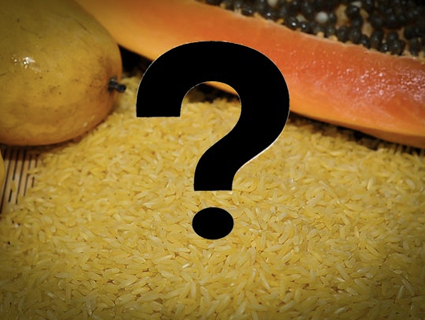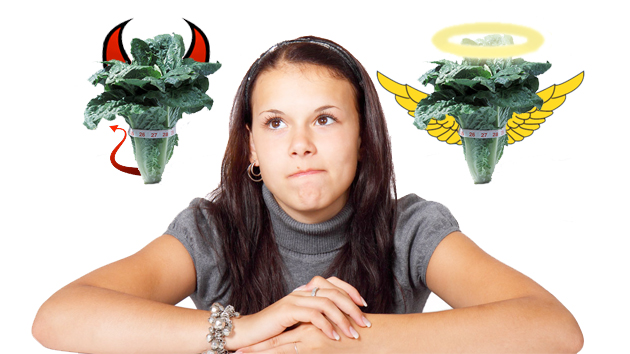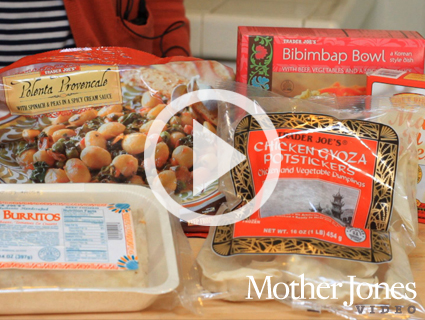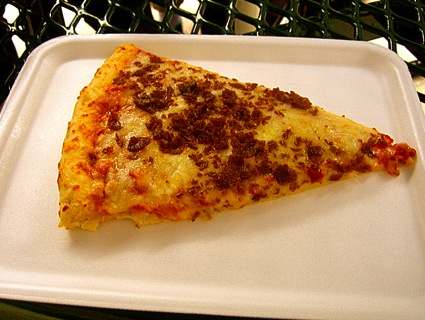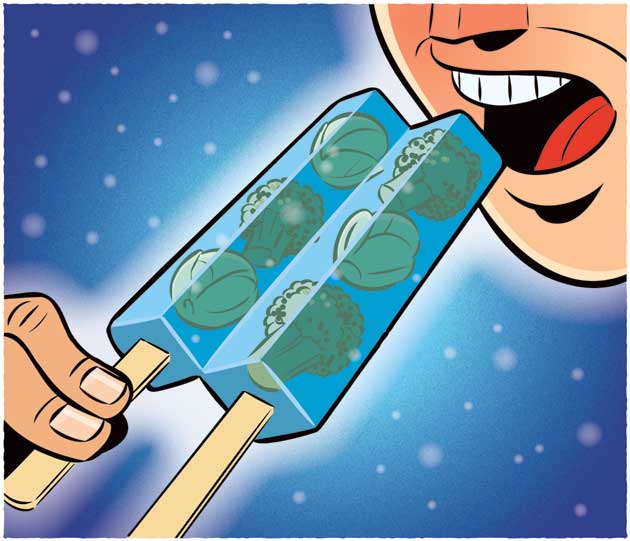
Illustration: Mark Matcho
So imagine this: You’re out for dinner at a trendy restaurant. You know the type—its name is a verb, the glasses are mason jars, and the date is printed at the top of the menu in Courier font. Scanning the dishes, you notice the following:
Housemade tagliatelle/local chèvre/canned tomatoes/frozen bell peppers
Canned? Frozen? Wait, aren’t the vegetables supposed to be picked that very morning and lovingly escorted to the restaurant by the local farmer who grew them? You storm out. Yelp will be hearing about this.
Okay, I made that up. I’ve never been to any restaurant that brags about sourcing from the canned-goods aisle and the freezer case. My friends who cook avoid those sections of the supermarket like the plague. But in the great backlash against conventional processing, preserved fruits and veggies might have gotten a bad rap. Blasphemous as it may seem, there are a few good reasons to stray from the produce aisle on occasion:
-
Preserved produce is often cheaper and more readily available. Sure, it’s great to stick with what’s in season. But I dare you to make it through winter without a single recipe that calls for tomatoes. (Stews and pasta sauce, anyone?) The canned stuff only costs a buck or two, and it’s guaranteed tastier than the wan and mealy fresh version.
-
It can be nutritionally equivalent, or even superior, to fresh. Some of the vitamins and minerals in produce start to degrade soon after harvesting, explains Diane Barrett, a food scientist at the University of California-Davis who has studied the nutritional differences between processed and fresh. By the time a stalk of broccoli makes it from the farm to the supermarket to your refrigerator, it has already lost some of its nutritional value. “Fruits and vegetables are frozen within hours of harvest, so that actually allows you to retain those nutrients,” says Barrett, who receives industry funding.
Cooking also degrades certain nutrients, vitamin C in particular. Since vegetables such as broccoli and spinach are blanched (boiled briefly) before freezing, you might think they’d end up with less vitamin C than their fresh counterparts. Barrett’s analyses, however, have found little difference—likely because the fresh produce already has lost some vitamin C sitting on the shelf. Plus, blanching may make vitamins A and E more digestible, Barrett says. Freezing and canning don’t seem to affect other nutrients much: Fiber remains intact, as do minerals such as potassium and zinc. If you’re cooking veggies, fresh or frozen, she recommends steaming them, since B and C vitamins can leach out when you boil—to say nothing of the flavor.
-
It may contain less pesticide. Before fruits and vegetables are processed, some of them are washed and put through a machine that jostles them around to remove remaining dirt and debris. Some are also blanched and peeled. Thanks to this prep work, says Carl Winter, a food scientist at UC-Davis’ Cooperative Extension, processed fruits and vegetables generally have less pesticide residue than fresh conventional produce. (On the downside, most cans still contain the hormone-disrupting compound bisphenol A, although a few manufacturers—such as Eden Foods—are transitioning to BPA-free cans.)
-
It can be better for the environment. “Fresh fruits and vegetables require cold storage, too,” notes Sean Cash, an associate professor of agriculture at Tufts University’s Friedman School of Nutrition Science and Policy who has studied the environmental footprint of produce. “The difference between 28 degrees and 48 degrees is actually not that great.” Canned foods require even less energy, since they are shipped and stored at room temperature. What’s more, Cash says, while fresh specialty crops like berries are flown from South America, their frozen and canned counterparts generally travel by ship, on a fraction of the fuel. Even locavores, he adds, still have to get themselves to the farm or farmers market to pick up their veggies.
-
It may result in less food waste. Home cooks often trash tough broccoli stems, fruit rinds, and vegetable peelings. But large-scale processors don’t always send that stuff to the landfill. Green Giant’s trimmings, for instance, are used as compost for its research farm, or given to local farmers as animal feed. Earthbound Farm, a large organic producer, sells some of its scraps to juice makers; its frozen spinach and broccoli waste goes to a manufacturer of organic dog food.
Of course, there are other issues with industrially grown and processed produce—like the fact that many crops are bred for shelf life and shipability over flavor and nutritional goodness.
Still, some food-world celebs have pushed back a bit against the freshness police. The pop-nutrition guru Dr. Oz recently sang the praises of frozen foods in a Time cover story. Foodie journalist and author Michael Pollan urges his website’s readers, “Don’t overlook frozen vegetables when they are out of season.” And New York Times food columnist Mark Bittman once recounted asking a chef at an upscale restaurant where his delicious Brussels sprouts hailed from: “He said without hesitation, ‘the freezer.'”
Brave man. I hope other chefs were listening.

